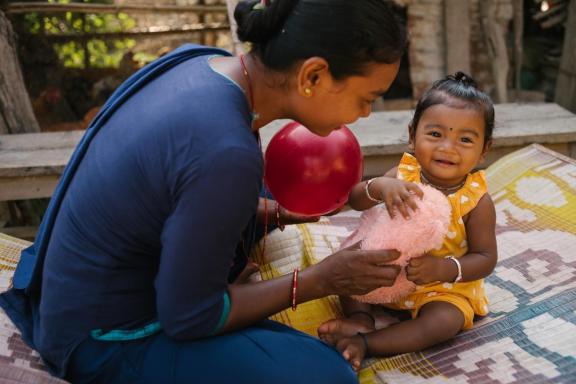
USAID Advancing Nutrition participated in the first-ever virtual South Asia Social and Behavior Change Communication (SBCC) Conversation that took place from December 7 to 9, 2021. The event was hosted by a consortium of global partners including the BBC Media Action, Breakthrough, Centre for Communication and Change—India, Johns Hopkins Center for Communication Programs, and UNICEF, among others. It brought together social and behavior change leaders, practitioners, planners, and researchers working in South Asia to advance dialogue, inspire collaboration, and spark innovation across intersecting focus areas. The Conversation also provided a platform for participants to share South Asia-related abstracts accepted for the 2022 International Social and Behavior Change Communication Summit initially planned for 2020.
Event organizers invited USAID Advancing Nutrition to give an oral presentation during the 5th session of the second day of the Conversation, on Innovating and Collaborating—Making Strides for Behaviour Change—a key social and behavior change (SBC) topic. Kelsey Torres, technical specialist, delivered the presentation (minute 24:50) titled Less is More: Prioritising Behaviors for Effective Multi-Sectoral Nutrition SBC. She shared a straightforward—and critical—process for prioritizing behaviors for a nutrition program, summarized in USAID Advancing Nutrition’s Prioritizing Multi-Sectoral Nutrition Behaviors Tool.
People are complex, and contexts are all different. Quality SBC goes beyond giving people information to address the factors that influence what people can do in their context. To do this well, programs need to focus on the behaviors that will make the greatest difference to nutrition outcomes. In this case, less is more!
Learn more about USAID Advancing Nutrition’s work in social and behavior change:
- Building on partner experiences, USAID Advancing Nutrition is developing a suite of practical tools to harmonize design, implementation, monitoring, and evaluation of nutrition SBC programs in food and health systems.
- Our technical experts examined peer-reviewed literature on engaging family members for improved maternal and child nutrition and prepared program guidance. As a follow-up to these efforts, the project is planning to launch a Community of Practice for practitioners and researchers interested in the topic.
- UNICEF and USAID Advancing Nutrition have partnered to make images related to recommended infant and young child feeding practices available for others through the Image Bank IYCF Image Bank.